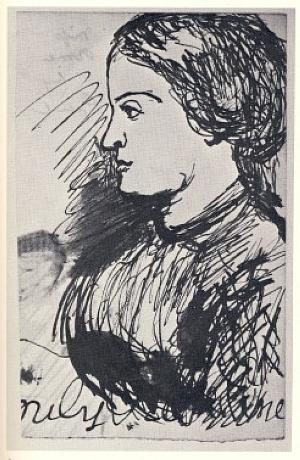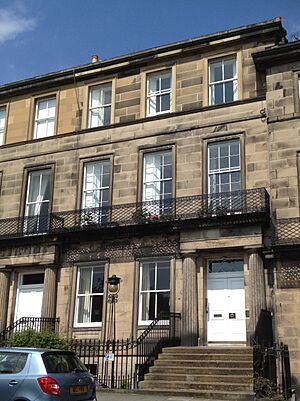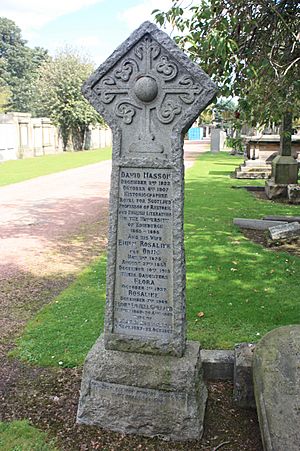Emily Rosaline Orme facts for kids
Quick facts for kids
Emily Rosaline Orme
|
|
|---|---|

c. 1853 by Dante Rossetti
|
|
| Born | 1835 |
| Died | 1915 (aged 80) |
| Other names | married name Masson |
| Known for | Campaigner for women's suffrage |
| Spouse(s) | David Masson |
| Children |
|
| Relatives | Eliza Orme |
Emily Rosaline Orme (1835–1915) was an important leader of the Edinburgh National Society for Women's Suffrage. She was a key campaigner for women's suffrage in Scotland. Women's suffrage means the right for women to vote in elections.
Contents
Early Life and Artistic Connections
Emily Rosaline Orme was born in 1835. She was one of eight children. Her parents were Eliza Andrews and Charles Orme. Her family was quite wealthy. They made their money from brewing.
When Emily was young, she lived in London. There, she met famous artists and writers. These included members of the Pre-Raphaelite movement. Some of these artists were Holman Hunt and the Rossetti family. Dante Gabriel Rossetti even drew a sketch of Emily when she was about 18 years old. This shows how close her family was to these artists.
Emily also met an academic named David Masson. He was introduced to her by a librarian at the British Museum. This librarian was also a poet named Coventry Patmore. Patmore was married to Emily's aunt, Emily Augusta Patmore.
Marriage and Move to Edinburgh
Emily married David Masson on August 27, 1853. They first lived with her parents. They shared friends who were interested in politics, art, and literature. Emily and David had four children together. Their children were David Orme Masson, Flora Masson, Helen, and Rosaline Masson.
A famous philosopher, John Stuart Mill, visited them. He also supported women's right to vote. He even spoke about it later in Edinburgh.
In 1865, Emily and David moved to Edinburgh, Scotland. David became a professor at the University of Edinburgh. He strongly supported women getting a university education. He was one of the first professors to teach women at the Edinburgh Association for the University Education of Women. He also supported women studying medicine.
Campaigning for Women's Right to Vote
Emily and her husband were very active in the campaign for women's suffrage. They spoke at events in London and Edinburgh.
In 1874, Emily joined the Edinburgh National Society for Women's Suffrage. This group worked to get women the right to vote. Two years later, she became a member of its main committee. Then, in 1877, she became a joint honorary secretary with Eliza Wigham.
Emily was a main speaker at many meetings in Edinburgh in late 1877. She and other women from Edinburgh also went to a big protest in London on May 6, 1880.
In 1881, Emily's daughter, Flora Masson, joined the Edinburgh Ladies Debating Society. Emily also joined this group. They often discussed women's suffrage there.
The University of Edinburgh later named its first women's student residence after David Masson. It was called Masson Hall.
Later Life and Family
Emily's husband, David Masson, passed away in 1907. Emily died in 1915. She was buried with her husband in Grange Cemetery in south Edinburgh.
Emily's daughters, Flora Masson and Rosaline Masson, also joined the suffrage movement. Rosaline became a writer. Emily also had another daughter, Helen. Her son, Sir David Orme Masson, became the first professor of Chemistry at the University of Melbourne in Australia.
Emily's sister, Eliza Orme, was the first woman to earn a law degree in England. Her younger brother, Augustus Charles Andrews, had a daughter named Mabel Barltrop. Mabel became a religious leader.
 | Sharif Bey |
 | Hale Woodruff |
 | Richmond Barthé |
 | Purvis Young |



